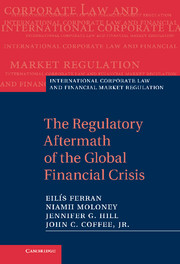Book contents
- Frontmatter
- Contents
- Foreword
- Notes on Contributors
- Acknowledgements
- Table of cases
- Table of legislation
- 1 Crisis-driven regulatory reform: where in the world is the EU going?*
- 2 The legacy effects of the financial crisis on regulatory design in the EU
- 3 Why did Australia fare so well in the global financial crisis?
- 4 The political economy of Dodd-Frank: Why financial reform tends to be frustrated and systemic risk perpetuated
- Index
Foreword
Observations about the crisis and reform
Published online by Cambridge University Press: 05 December 2012
- Frontmatter
- Contents
- Foreword
- Notes on Contributors
- Acknowledgements
- Table of cases
- Table of legislation
- 1 Crisis-driven regulatory reform: where in the world is the EU going?*
- 2 The legacy effects of the financial crisis on regulatory design in the EU
- 3 Why did Australia fare so well in the global financial crisis?
- 4 The political economy of Dodd-Frank: Why financial reform tends to be frustrated and systemic risk perpetuated
- Index
Summary
Overview
The most recent financial crisis is of paramount concern. But in the long run, what it reveals may be of greater concern. It is said that this crisis is a once-in-a-century event. If viewed narrowly in terms of the proximate causes, this may be true. But closer examination of the crisis reveals a fertile ground for additional crises, albeit with each one perhaps displaying unique features. So in devising reforms, regulators must not only address the most immediate causes of this crisis, they must also tackle the fertile ground from which they spring.
In essence, this crisis is the result of an evolution in markets and financial services. Over the past fifteen years, the structure and principal characteristics of the world's financial system have dramatically changed. The current turmoil is likely the result of the system having failed to adapt to these fundamental changes.
The modern market:
is global in nature, featuring highly mobile capital;
is characterized by fierce competition among financial service providers;
no longer features barriers between historically separate financial products, sectors and actors;
features increasing cost to investors, financial entities and regulators of monitoring conduct and risk due to increasing use of complex products; and
features large and relatively liquid unregulated institutional financial markets paralleling the regulated markets.
- Type
- Chapter
- Information
- The Regulatory Aftermath of the Global Financial Crisis , pp. xi - xxviPublisher: Cambridge University PressPrint publication year: 2012
- 3
- Cited by



